Photographs: Courtesy Narendra Modi's Web site Sheela Bhatt in Rajkot
For the first time since the riots of 2002, Gujarat Chief Minister Narendra Modi finds himself on uncertain territory in Saurashtra, where the intense caste politics of the Patels is now intertwined with the water problems of all the farmers of the region. Sheela Bhatt's stunning report:
Gujarat Chief Minister Narendra Modi is tense.
His party, the Bharatiya Janata Party, feels insecure. BJP cadres are showing all the signs of being nervous.
Modi has not given interviews to any of his favourite television channels during this election campaign.
Modi does not know how to react to his former mentor Keshubhai Patel's rebellion against him and the BJP.
If Modi dismisses Keshubhai Patel, then he will give the veteran leader a chance to win sympathy; if Modi goes soft on Patel, it will be seen as a sign of weakness.
In many pockets of Saurashtra, particularly among the Patels, Modi is a hate figure.
The Patels are a divided community, but those who are against Modi are vehemently against him.
Please ...
Modi's 'arrogant' style of functioning has irritated the Patels
Image: Pravinbhai ManiyarPhotographs: Uttam Ghosh/Rediff.com
The Patels are furious with Modi for "adopting a divide and rule policy," Pravinbhai Maniyar, a Rashtriya Swayamsevak Sangh veteran who is now with Keshubhai Patel's Gujarat Parivartan Party, told Rediff.com
Modi's "arrogant" style of functioning has touched a raw nerve among many Patels who are "ready to teach him a lesson," Maniyar warns.
Mayurbhai Gorasiya of Kamigadh village in Amreli district says, "Modi has money for garib melas and vibrant melas, but not for our village roads."
Gorasiya spoke to Rediff.com at length about the woes in his village for lack of funds in the panchayat.
In recent days Modi has, uncharacteristically, responded to the Congress on every little issue that its leaders raise.
Modi's experiment to go hi-tech with the use of 3D campaign technology has failed. He addresses seven to eight meetings a day and tries to cover as many constituencies as possible.
Bureaucrats in his office call up party leaders all over Gujarat to ascertain the response to Modi's speeches.
At a personal level, Modi's battle to retain Gujarat by claiming a hat-trick of electoral victories has turned into a war for survival for him.
Public sentiment in urban areas in Gujarat largely favours Modi, but rural Saurashtra is giving the chief minister a tough time.
Please ...
If the Patels are on your side, victory is a smooth affair
Image: A BJP election office in RajkotPhotographs: Uttam Ghosh/Rediff.com
The delimitation of Gujarat's assembly constituencies and Keshubhai Patel have emerged as the two blind factors in the great gamble that Modi has been playing.
Both the Congress and BJP accept that post-delimitation, the caste composition of some 60 seats has changed so much that the 2002 and 2007 election experience cannot be applied to it.
"We are blank in mapping victory or defeat for the BJP in Saurashtra," says Kaushik Mehta, editor of a local daily newspaper.
Fresh lessons will be learnt on December 20 when the results come in.
In Saurashtra, many BJP leaders provide feedback that of the 48 assembly seats in the region, the BJP will win around 25/27 seats in the best case scenario.
Leuva Patel voters are crucial in about 18 seats.
In Gujarat, the "Patels" are called "the BJP's Muslims." If they are on your side, victory is a smooth affair.
Please ...
War on Modi has been declared in Saurashtra
Image: Naresh Patel, the influential community leaderPhotographs: Uttam Ghosh/Rediff.com
Leuva Patels are more concentrated in four districts in Saurashtra and in Surat.
Here is the crunch. What is called the 'Khodal Dham' factor poses a headache for Modi.
In Kagwad village near Jetpur, Leuva Patels led by the influential community leader, Naresh Patel, are building a temple to Khodiyar Ma, whose divine power the Patels worship.
The Khodal Dham complex will have educational institutions as well. The project is worth Rs 300 crore (Rs 3 billion).
The idea of Khodal Dham has ...
Modi's perceived injustice to Saurashtra is widely felt in the region
Image: Irrigation is a major issue in Saurashtra, which received less than half the amount of rain this yearPhotographs: Uttam Ghosh/Rediff.com
Clearly, in rural Saurashtra, Modi faces an undercurrent against his policies that has made education, health and electricity costly.
As the price of onions handed a defeat to the BJP government in New Delhi in the late 1990s, the issue of lack of water for irrigation will throw up a few surprises for Modi in rural Saurashtra.
Modi's perceived injustice to Saurashtra is widespread not only among the Leuva Patels, but among the Ahirs and Kolis in rural areas as well.
For the last 10 years, rain-dependent Saurashtra has received more than the usual rainfall so things went smoothly for Modi whose development plans are not evenly spread across the state.
Residents of Saurashtra have noted with envy the development in Kutch after the devastating January 26, 2001 earthquake, and feel left behind in Modi's march for 10 per cent growth.
Ukabhai Kikani, a diamond merchant from Bagsara near Amreli, told Rediff.com: "Modi does not have a budget for Saurashtra. Our battle is for our rights. Modi's 'Shining Gujarat' has failed. Where is the broad gauge railway for Amreli? Where is water for farmers? Where is the corruption-free administration? At every step we pay bribes."
"We are fed up of the worsening law and order situation. It is not possible to hold on to your land if you are a non-resident Gujarati."
"We are what we are because of our hard work," adds Kikani. "Not because of vibrant Gujarat melas."
This year Saurashtra received less than half the amount of rain. As a result, 30 per cent cotton crops failed. If irrigation facilities had improved or increased with the help of Narmada waters in the last 10 years, farmers think they would have been better off.
Please ...
The GPP is the alternative for anti-Modi and anti-Congress Patel voters
Image: Water is a major issue in SaurashtraPhotographs: Uttam Ghosh/Rediff.com
The intense caste politics of the Patels of Saurashtra is now inter-twined with the water problems of all the farmers in the region.
Besides this, the Congress gameplan of playing the GPP card in the Russian roulette of the Indian electoral system (where the candidate with the highest number of votes wins) has created nerve-wrecking possibilities.
The Congress knew the people who are displeased with Modi and his haughty behaviour, those who are fed up of the neglect of Saurashtra by the BJP government and those who are disgusted with Modi for renominating tainted MLAs may not vote for the Congress out of apathy or just because they are anti-Congress or have never voted for the Congress before.
The GPP is then the alternative for anti-Modi and anti-Congress Leuva Patel voters.
If the GPP is unable to snatch Leuva Patel voters in big numbers from the BJP, the Congress will see a Punjab-type situation where a breakaway group of the Badal family helped the Shiromani Akali Dal-BJP combine retain power in the state.
Naresh Patel has provoked the Patels to vote before noon on Thursday. If the voting percentage is high before noon, Modi will miss some heartbeats.
Early birds at polling booths, it is believed, are likely to be Leuva Patels who want Modi out of power in Gandhinagar.
Some observers argue that if the voting in Saurashtra is too low, the Congress will miss the chance of a lifetime.
The situation is such that in Saurashtra, the BJP wants to see that the percentage of voting remains low (that Patels, who are supposedly anti-Modi, stay away from the polling booths) and polling in the rest of Gujarat has to be high to ensure pro-Modi voters come to the booths.
Please ...
BJP leaders feel the party will win between 105 and 120 seats
Image: Paramilitary personnel keep vigil in RajkotPhotographs: Uttam Ghosh/Rediff.com
At the time of filing this report (2 am on December 13), after visiting a couple of BJP campaign offices in Rajkot, the undeclared capital of Saurashtra, local party leaders and workers looked nervous. Privately, they shared their anxiety with Rediff.com
"Behen, badi baju afratafri che (Sister, everywhere there is commotion)," a former BJP MLA told Rediff.com, adding, "I have been in politics for 30 years, but this election is very confusing."
"The gap in our understanding of the election in Saurashtra's 48 seats is so huge!" the former MLA confessed. "We are trying to judge: Is this election against Modi or for Modi? Are voters in Saurashtra out to dislodge Modi or are they out to snub Keshubapa (Keshubhai Patel)?"
Barring in a few constituencies, political workers of both the BJP and Congress fail to show off over-confidence on the eve of polling. The absence of issues makes them tense.
In the two-party polity of Gujarat, there is the third angle of the Keshubhai Patel-led GPP (whom Modi calls gappa or worthless party, that suffers from over-confidence while the BJP looks anxious and the Congress awaits the results with its fingers crossed.
In the last 10 days,Rediff.com has not encountered any Congress or BJP leader who has confidently predicted the fortunes of their party on December 20. They present multiple scenarios.
The Congress thinks it will get anything between 65 and 70 seats even if the GPP strategy does not work.
The Congress thinks if the Leuva Patels vote for the GPP, the BJP is in trouble. BJP leaders no longer speak of winning 150 seats and breaking Congress leader Madhavsinh Solanki's 1985 record.
In off-the-record conversations, BJP leaders claim -- modestly -- that the party will win 105 to 120 seats.
Please ...
Gujaratis themselves have brought about change
Photographs: Courtesy: Narendra Modi's Web site
Modi feels insecure and a bit rattled to see the unfolding dissent of voters in Saurashtra, the epi-centre of Patelism.
This is Modi's most difficult moment since the riots of 2002.
Ahmed Patel, Congress president Sonia Gandhi's political secretary, is not sure if the Leuva Patels' exit from the BJP will draw anti-Patels towards the BJP or not. The Congress does not want non-Patels flocking to the BJP for the fear of the rise of Patelwad this election.
The election in Saurashtra is all about castes and their self-interest in political parties.
Modi's personal charisma does not have the added advantage of either the Hindutva card or the development card. He is left to bank on the urban youth and women voters more than ever.
Former BJP MP Vijay Rupani told Rediff.com, "Keshubhai's party will not affect us. The GPP has failed to get our leaders or cadres. When (Shankarsinh) Vaghela broke the party he took away 45 MLAs and 7 MPs. Keshubhai got nobody from the BJP. They have not been able to field talented candidates. Also, the Congress is witnessing rebellion here, there and everywhere. These factors will give us comfortable victory in Saurashtra."
This Gujarat election is a fascinating one where the so-called experiments of the Sangh Parivar to make Gujarat a Hindutva laboratory have clearly halted.
It is a turning point in Gujarati society where it takes time to find Vishwa Hindu Parishad and Bajrang Dal offices in Modi's regime.
What secular activists, the Congress or the English media could not do, Gujaratis themselves have done: They have brought about change.
Hindu-Muslim relations are back to a practical level. Hindus have returned to their comfort zones.
In Saurashtra, the assertion of caste identity is in the making once again, to get a bigger pie of Modi's developmental plans.
...

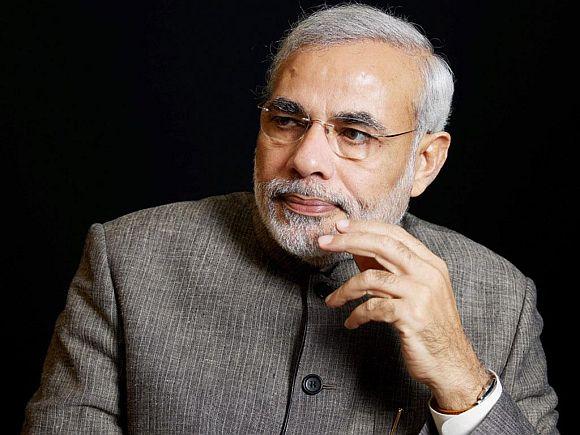

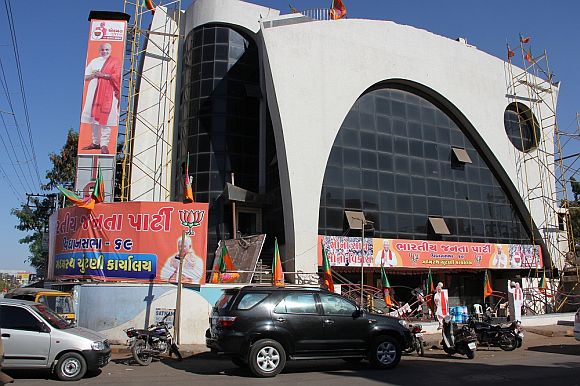
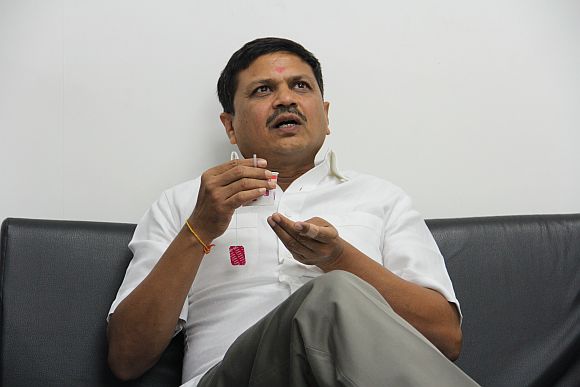
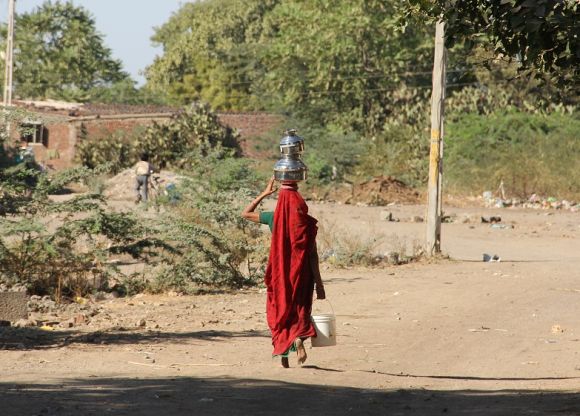
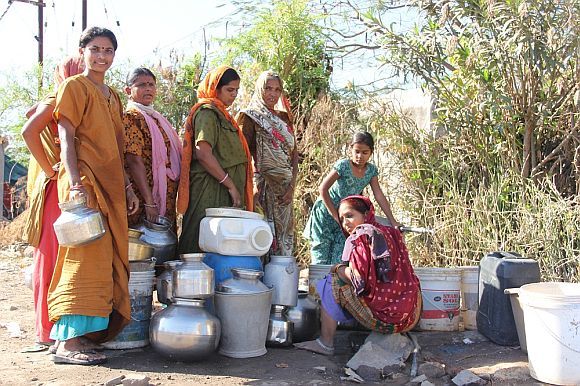
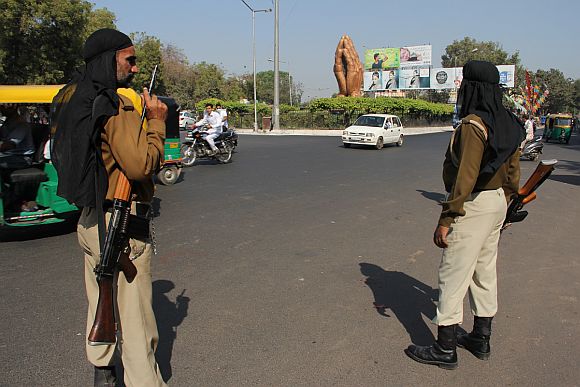
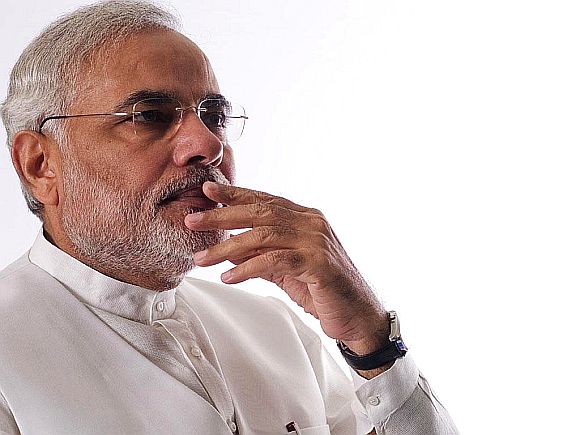
article